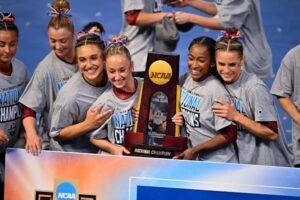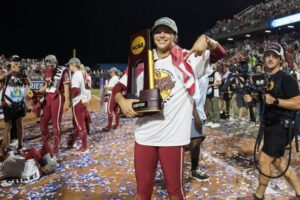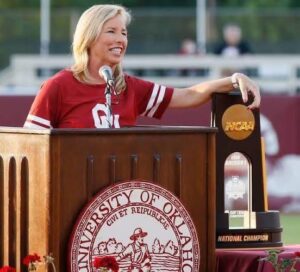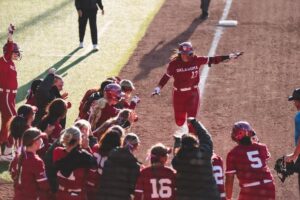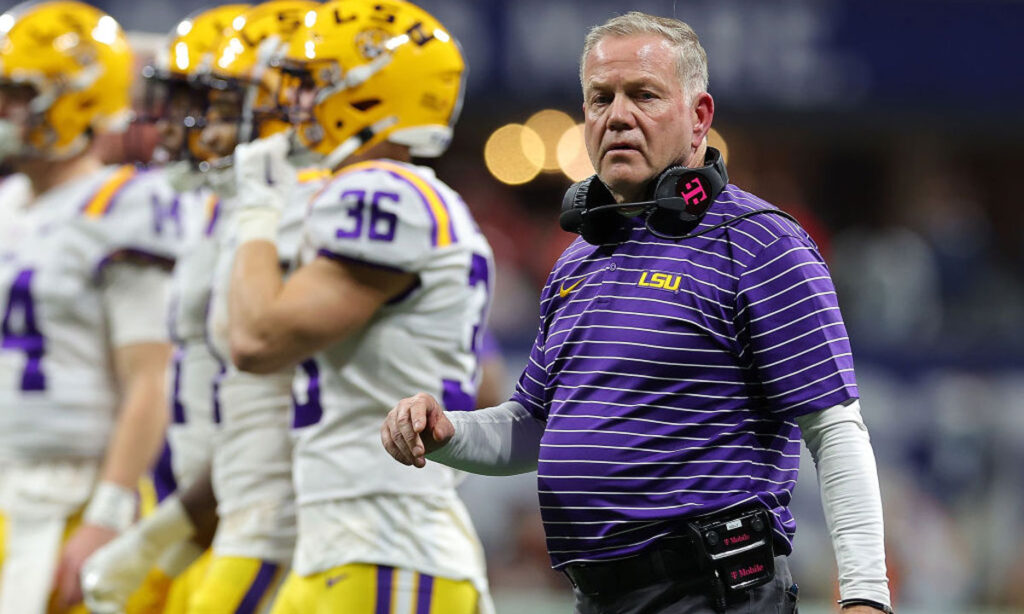
Today, during College Sports Day on The Hill, student-athletes, coaches, and administrators from LSU Athletics made a strong impression on lawmakers in Washington, D.C., to talk about the future of collegiate athletics.
On College Sports Day in Washington, D.C., LSU Athletics made a profound impact, offering an unforgettable glimpse into the future of collegiate athletics. On this day, LSU student-athletes, coaches, and administrators met with lawmakers to discuss the future of collegiate sports, providing their insights into issues ranging from the student-athlete experience to the evolving landscape of NIL (Name, Image, Likeness) rights and the broader scope of college athletics in the 21st century. The discussions were pivotal in showcasing LSU’s leadership, advocating for both immediate changes and long-term improvements in the world of college sports.
The event was not just a ceremonial occasion but an important step in the dialogue surrounding the future of college athletics. LSU’s involvement, marked by an impressive representation of top-tier athletes and leadership, carried significant weight in influencing policy debates at a time when college sports are in the midst of sweeping changes. The university’s delegation, including athletic director Scott Woodward, head football coach Brian Kelly, and some of the school’s star athletes, presented a united front that emphasized the university’s commitment to enhancing the student-athlete experience, preserving the integrity of collegiate competition, and addressing the evolving financial landscape.
LSU’s Representation at College Sports Day
The LSU delegation on Capitol Hill included key figures who were instrumental in shaping the university’s athletic culture. Scott Woodward, the athletic director, played a central role in leading the charge for LSU’s message, advocating for the university’s commitment to student-athlete welfare while also addressing the complexities of financial distribution within college athletics. Woodward has long been a champion of reform, seeking innovative solutions to problems affecting student-athletes, especially with regard to NIL rights and the rising costs of collegiate sports programs.
Head coach Brian Kelly, whose arrival at LSU in 2022 marked a new chapter for the football program, spoke passionately about the importance of creating a sustainable model for student-athletes that focuses on education, safety, and long-term well-being. Coach Kelly’s comments were particularly poignant, as they reflected the balance that LSU aims to strike: one between high-level athletic performance and the needs of athletes beyond the field.
LSU’s student-athletes also played an essential role in the event, sharing their personal stories and perspectives on the evolving world of college athletics. One of the standouts was senior track and field star, Sha’Carri Richardson, who has used her platform to advocate for fair treatment of athletes in an ever-changing sports landscape. Richardson and other athletes, including basketball and football players, spoke to the significance of NIL deals, how these opportunities are impacting their lives, and the importance of maintaining a balance between athletic performance and academic success.
The Power of NIL Rights in College Sports
One of the most significant topics discussed during LSU’s time on Capitol Hill was NIL, which has completely changed the way college athletics operates. Since the NIL legislation passed in 2021, college athletes are now able to profit from their name, image, and likeness, but the rule changes have also created a complex environment. The discussions emphasized the need for comprehensive regulations and uniform standards across all states and universities to level the playing field and ensure fairness for athletes.
While NIL opportunities have provided many athletes with lucrative deals, they have also led to disparities across different universities, sports programs, and conferences. LSU has become one of the premier schools where athletes have benefited from NIL opportunities, with players across multiple sports securing significant sponsorships. However, LSU leadership understands that the potential for NIL deals must be balanced with ensuring that student-athletes maintain their focus on academics and personal development.
Scott Woodward made it clear that LSU supports athletes’ ability to make money off their likeness, but the program also supports measures that ensure athletes are making informed decisions. LSU has been at the forefront of providing education for athletes on managing their finances, understanding contracts, and leveraging their social media platforms to secure NIL deals. This educational aspect was emphasized during the meeting with lawmakers, with LSU leaders calling for legislation that ensures transparency and safeguards for student-athletes in their NIL ventures.
Mental Health, Safety, and Long-Term Welfare of Student-Athletes
Beyond NIL, LSU Athletics also focused on the holistic development of student-athletes, particularly in the areas of mental health, physical safety, and career transition support. The pressure of being a student-athlete—balancing rigorous academic schedules with intense athletic commitments—can take a toll on mental health, and LSU has made a point to address these challenges head-on.
Several LSU athletes shared their experiences of coping with the demands of their sports while maintaining their academic commitments. They advocated for expanded mental health services for college athletes, including access to counselors who specialize in the unique challenges of being both a student and a competitor. Many athletes spoke of the importance of having a support system that goes beyond the field, ensuring that athletes are not only equipped to perform at a high level but are also given the tools to thrive emotionally and mentally.
Furthermore, LSU’s leadership made it clear that physical safety must remain a top priority. With the growing concerns surrounding injuries, particularly in high-contact sports such as football, LSU is leading the way in establishing state-of-the-art facilities and safety protocols designed to protect athletes. This includes access to cutting-edge technology for monitoring and preventing injuries, as well as comprehensive rehabilitation programs.
The Long-Term Impact on Career Development
Another important area of focus during College Sports Day was the long-term development of student-athletes’ careers. While many student-athletes dream of turning pro, the reality is that most will not have professional careers in their sport. Therefore, LSU leaders emphasized the importance of preparing athletes for life after sports, equipping them with the skills, education, and experiences needed to succeed in their post-athletic careers.
LSU’s program already includes significant resources dedicated to career development, with workshops on resume building, interview skills, and networking. Additionally, the university has partnerships with businesses and organizations that allow student-athletes to gain valuable experience outside of athletics. This holistic approach to career development was a key talking point during the event, with LSU advocating for expanded funding and resources to support career transition programs at the national level.
The Evolution of Collegiate Athletics in a Post-NIL World
The NCAA and universities across the country are navigating an era of change, with NIL rights and the increased commercialization of college sports reshaping the landscape. LSU has made it clear that it embraces these changes, but also that it is committed to preserving the traditional values of college athletics—integrity, amateurism, and the pursuit of excellence both academically and athletically.
As the meeting with lawmakers concluded, LSU made a compelling argument for maintaining the spirit of collegiate sports while adapting to the new realities of the modern era. The discussion underscored the importance of universities taking a proactive role in shaping the future of college athletics, ensuring that student-athletes are treated fairly, receive ample opportunities, and are protected in a rapidly evolving environment.
College Sports Day on Capitol Hill was a landmark event in the ongoing conversation about the future of collegiate athletics, and LSU Athletics played a key role in shaping that conversation. From advocating for the fair treatment of student-athletes in the context of NIL to highlighting the importance of mental health, safety, and career development, LSU’s message was clear: the future of collegiate athletics must prioritize the welfare and well-being of athletes while embracing the changing landscape.
Through its leadership, LSU demonstrated not only its commitment to current and future student-athletes but also its dedication to influencing meaningful change in the world of college sports. As the landscape continues to evolve, LSU’s impact on Capitol Hill will undoubtedly be felt for years to come, helping to ensure that the voices of student-athletes are heard, their needs are met, and their futures are protected.


